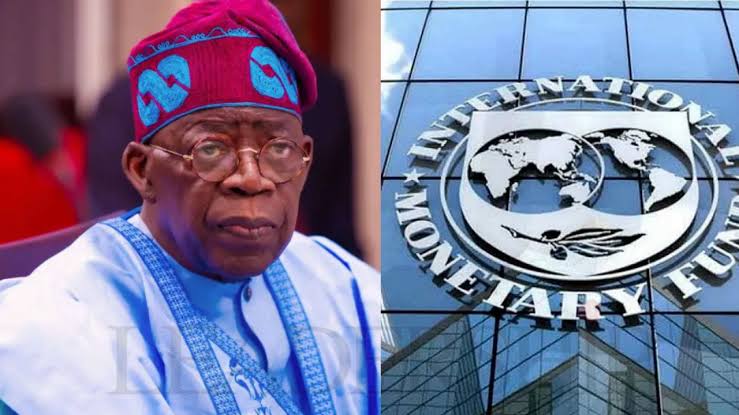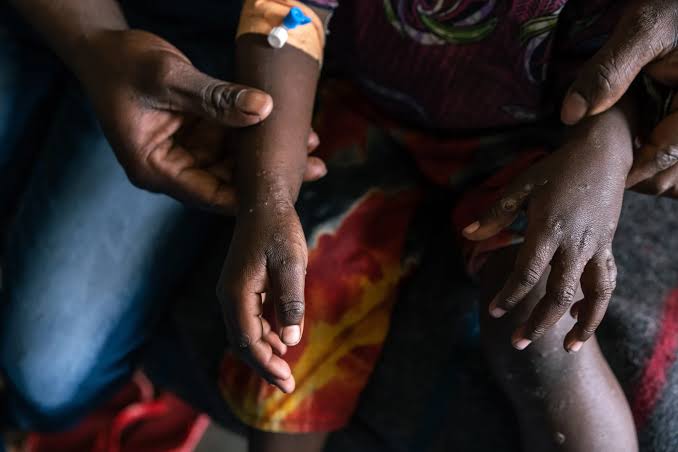Metro
Tinubu’s reforms in Nigeria not working— IMF
Published
2 months agoon
By
Isaac Dachen
The International Monetary Fund (IMF) says the various reforms carried out by Nigerian President, Bola Tinubu, are not working for the country as the government is still struggling for positive impacts 18 months into ythe life of the administration.
In it latest outlook report of the sub-Sahara Africa released on Friday, the IMF indicated that the broad-based economic reforms embarked upon by the current federal government were still to create positive impacts on the Nigerian citizens.
The IMF report, which also acknowledged a few countries that had recorded little success through reforms, categorically mentioned Nigeria amongst those failing to meet desired results, predicting that the average economic growth rate in the sub-Saharan region would remain at 3.6 per cent for the full year 2024, but put Nigeria’s growth rate at 3.19 per cent, below the average.
Presenting the report at the Lagos Business School (LBS), IMF Deputy Director, Catherine Patillo, said the macroeconomic imbalances in the region have started reducing with notable improvements in some countries, but excluded Nigeria in the good news.
“More than two-thirds of countries have undertaken fiscal consolidation. With the median primary balance is expected to narrow by 0.7 percentage points alone in 2024. And these have included notable improvements in Cote d’Ivoire, Ghana, and Zambia, among others,” Patillo said.
‘‘On the imbalances side, median inflation has declined in many countries. And it’s already within or below the target band in about half the countries.
“But contrary to this position, Nigeria’s inflation which had slowed down in July and August returned to uptrend in September 2024 with further rise in October while analysts predict that November and December would sustain the uptrend.
“Also at current 33.8 percent, Nigeria’s inflation rate is largely off the 21 percent target for 2024.
‘‘Inflation is still in double digits in almost one-third of countries, including Angola, Ethiopia, and Nigeria, and above target in almost half of the region, particularly where monetary policy is not anchored by exchange rate pegs.”
Patillo went on to say that though exchange rate was improving across most countries in the region, it was not the same in Nigeria.
“Looking further at exchange rates, we do see that foreign exchange pressures have largely abated since the end of 2023.
“Nigeria has however recorded the worse exchange rate instability and local currency depreciation so far this year.
“Debt service capacity remains low by historical standards. In almost one-quarter of countries, interest payments exceed 20 percent of revenues, a threshold statistically associated with a high probability of fiscal stress. And rising debt service burdens are already having a significant impact on the resources available for development spending.
‘‘The median ratio of interest payments to revenues (excluding grants) currently stands at 12 percent. Some three-quarters have already witnessed an increase in interest payments (relative to revenue) since the early 2010s (comparing the 2010–14 average with the 2019–24 average). In Angola, Ghana, Nigeria, and Zambia, this increase in interest payments alone absorbed a massive 15 percent of total revenue,” Patillo added.
Looking into the near future, the IMF report painted a picture of mixed fortune for the region but grouped Nigeria amongst those that are still on the downside being one of the resource-intensive countries in the region. It also hinted that economic reforms and adjustments in Nigeria are faced with social and political resistance.
“Resource-intensive countries (RICs) continue to grow at about half the rate of the rest of the region, with oil exporters struggling the most.
“Second, both domestic and external financing conditions remain tight. Third, the region has recently witnessed several episodes of political fragility and social unrest. Political and social pressures are making it increasingly challenging to implement policy adjustments and reforms.
“Significant increases are anticipated in Ghana, as it continues reestablishing macroeconomic stability; Botswana and Senegal, reflecting rising resource exports (diamonds, oil, and gas); and Malawi, Zambia, and Zimbabwe, as they recover from drought. Growth is also expected to improve in South Africa, given positive post-election sentiment and a reduction in power outages.”
You may like
-


Nigeria: Marketers predict further price cut as another refinery begins operations
-


Kenya: Consumer inflation rises to 3.0% from 2.8%
-


Nigeria, China extend $2bn currency swap deal
-


‘Don’t start what you can’t finish’, ex-Nigerian official replies President Tchiani
-


Again, Starlink raises prices of its services in Nigeria
-


Niger citizen knocks President Tchiani for neglecting critical issues at home to peddle rumours against Nigeria
Metro
‘Don’t start what you can’t finish’, ex-Nigerian official replies President Tchiani
Published
3 weeks agoon
December 29, 2024
Former Nigerian Aviation Minister, Femi Fani-Kayode, has told President Abdourahamane Tchiani of Niger Republic to refrain from making infantile and puerile allegations that Nigeria is conniving with France and the Lakurawa terrorists to destabilize his country.
Tchiani had, during an interview with Radio-Télévision du Niger on December 25, accused the Nigerian government of using the sect, with the help of foreign security forces notably from France, to wreck havoc in his country, insinuating that President Bola Tinubu had been paid by the France government to allow their military to establish a base in Borno State.
He also alleged that Nigeria, acting in collaboration with the French government and the terrorist group, was responsible for an attack on the Niger-Benin oil pipeline on December 13, 2024, in Gaya, Dosso Region of Niger Republic.
But in a statement he posted on his official X handle on Sunday, Fani-Kayode who is popularly called FFK, said Nigeria does not need the help of France and thr Lakurawa terrorist to destabilize Niger Republic.
FFK insisted that Nigeria is not part of the western powers sponsoring terrorists organizations to wretch havoc on the West African sub region.
“If Nigeria wanted to destabilise Niger Republic, I do not believe that we would need France or any terrorist organisation to do so,” the politician wrote.
He noted that on the contrary, western powers are the ones behind terrorist organizations operating in the region and other parts of Africa.
“I have maintained that the western powers are behind the terrorist groups that have plagued the West African sub region over the last 15 years and for the last ten years I have publicly stated this and given my reasons.
“I am equally certain that Nigeria, being one of the major victims of these terrorist organisations, has had no part in it and that no Nigerian President, past or present, has indulged in such grave and dangerous actions.”
He went on to advice Tchiani against provoking Nigeria with unguarded and infantile utterances capable of stoking Nigeria against his country.
“The Nigerien Military Head of State, Abdourahamane Tchiani, would do well to be careful not to provoke our wrath with his absurd assertions and remain mindful of the fact that the defence budget for his country, Mali and Burkina Faso COMBINED is not up to 25% of Nigeria’s.
“Tchiani’s grave allegations that President Tinubu and NSA Nuhu Ribadu have been bought by the French to destabilise Niger Republic, that our Government is jointly sponsoring a terrorist group with France to do same and that there are French military bases in Nigeria are infantile, puerile, mendacious and asinine.
“It is a squalid attempt by the Nigerien Head of State to sow the seeds of dissention in our country, to alienate our people from constituted authority, to divide our people and to undermine the Tinubu administration,” he added.
“It is also highly provocative and the FG should consider the possibility of taking other more extreeme measures if this reckless provocation continues.
“We are under no obligation to show restraint when we are being undermined and maligned.
Metro
Zambia announces second case of Mpox as country battles cholera outbreak
Published
3 weeks agoon
December 28, 2024
The Zambian Ministry of Health has reported a second case of Monkeypox, popularly known as Mpox, in Kitwe region of Copperbelt Province.
Acting Health Minister, Douglas Syakalima, who made the announcement on Friday during a press conference in Lusaka, revealed that the Ministry is intensifying contact tracing and surveillance to curb further spread of the disease.
Syakalima who also addressed the ongoing cholera outbreak in Nakonde, Muchinga Province, said thus far, seven cases have been confirmed.
“The second Mpox case involves a 34-year-old female from Ndeke, Kitwe, who presented with symptoms including rash, fever, swollen lymph nodes, and oral ulcers on December 21,” Syakalima said at the press parley.
He noted that there was an initial misdiagnosis with chickenpox in Lumwana, North-Western Province, but laboratory tests on December 26 confirmed that it was Mpox.
Syakalima added that the patient’s husband, who works in a neighboring country with confirmed Mpox cases, had experienced similar symptoms earlier this month.
“Both patients are now stable and under close monitoring. A rapid response team has been deployed to trace contacts and prevent further spread,” he said, adding that eight close contacts of the couple are currently under observation, while nationwide surveillance has been heightened.
The Health Minister added that on December 26, five cholera cases were confirmed at Nakonde Urban Clinic with the first three patients, a husband, wife, and their son, admitted on December 24 with symptoms of diarrhea, vomiting, dehydration, and shock.
“Today, two more cases have been reported, bringing the total to seven confirmed cholera cases from the same household,” Syakalima stated.
He explained that Nakonde’s location as a border town with high cross-border movement poses a risk for the disease to spread to other parts of the country.
The Minister however, assured that the Ministry has deployed teams to trace contacts, chlorinate water sources, disinfect affected homes, and activate Incident Management Systems at district and provincial levels while surveillance has been heightened, and contact tracing is ongoing for 33 individuals.
“The government remains committed to preventing further spread of these diseases,” Syakalima assured.
EDITOR’S PICK


Nigeria: Marketers predict further price cut as another refinery begins operations
Oil marketers and the Nigerian Midstream and Downstream Petroleum Regulatory Authority expect refined petroleum product prices to reduce as another...


Kenya: Consumer inflation rises to 3.0% from 2.8%
Kenya’s statistics agency said on Tuesday that Kenya’s consumer price inflation increased slightly to 3.0% year-over-year in December from 2.8%...


South Africa’s Transnet’s half-year deficit hits $117m
Transnet, a state-owned logistics company in South Africa, announced on Tuesday that it had lost 2.2 billion rand ($117.48 million)...


Nigeria, China extend $2bn currency swap deal
A 15 billion yuan ($2 billion) currency-swap arrangement between China and Nigeria has been extended to boost investment and commerce...


Egypt’s central bank maintains overnight rates
As anticipated, Egypt’s central bank has maintained its overnight interest rates, stating that although inflation was predicted to drop significantly...


Illicit flows cost Nigeria, others $1.6bn daily— AfDB
According to the African Development Bank (AfDB), illicit money flows and profit shifting by multinational corporations doing business in Africa...


‘Don’t start what you can’t finish’, ex-Nigerian official replies President Tchiani
Former Nigerian Aviation Minister, Femi Fani-Kayode, has told President Abdourahamane Tchiani of Niger Republic to refrain from making infantile and...


Again, Starlink raises prices of its services in Nigeria
Elon Musk’s satellite internet service provider, Starlink, has again jacked up the prices of its services in Nigeria after an...


Former President of Moroccan club Raja sentenced to 3 years in prison
The former President of Moroccan top club, Raja Casablanca, Mohamed Aouzal, has been sentenced to three and a half years...


Zambia announces second case of Mpox as country battles cholera outbreak
The Zambian Ministry of Health has reported a second case of Monkeypox, popularly known as Mpox, in Kitwe region of...


